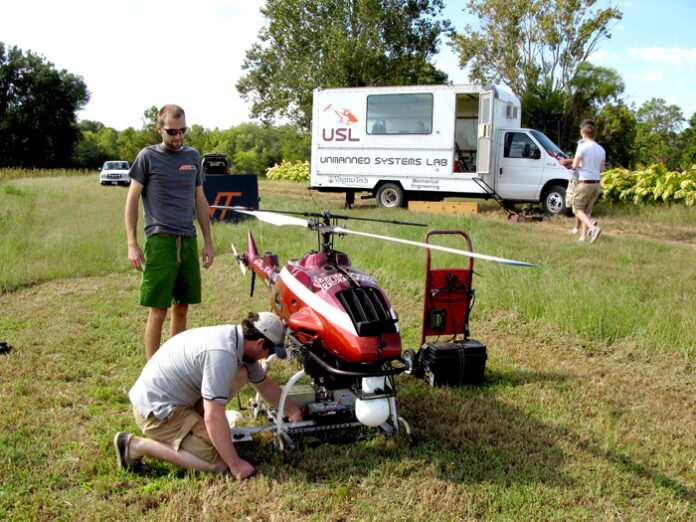
The Commonwealth of Virginia has announced it will award more than $2.6 million over three years in Federal Action Contingency Trust (FACT) funds to Virginia Tech to operate an unmanned aircraft systems test site in the state, officials from the governor’s office said Monday.
The grants will provide Virginia Tech with $1 million in fiscal year 2014, an additional $1.2 million in fiscal 2015, and $437,000 in fiscal 2016.
The test range is operated by the Mid-Atlantic Aviation Partnership, which is led by Virginia Tech and Rutgers University and represents an effort to safely develop unmanned aircraft systems. The University of Maryland has also agreed to partner with Virginia Tech and Rutgers on unmanned aircraft system integration.
“Virginia Tech is honored to be leading this effort for the Commonwealth of Virginia and extremely gratified by the commonwealth’s support,” said Virginia Tech President Charles W. Steger. “We are convinced that Virginia, teamed with New Jersey and Maryland, is poised to make the mid-Atlantic region the leader in unmanned aircraft system research, development, testing and evaluation, and manufacturing. I’m proud of our faculty with the Virginia Center for Autonomous Systems and Institute for Critical Technology and Applied Science for providing vital expertise in autonomous systems to this effort.”
The funds will take the Mid-Atlantic Aviation Partnership from its current “volunteer” status to a fully functional and revenue-producing organization, capable of competitively analyzing and testing unmanned aircraft systems for industry and government.
The partnership intends to start charging clients for flight operations by March 2014, with the goal of becoming a self-supporting operation that will positively affect Virginia’s economy and budget.
Partnership leaders say integrating unmanned aircraft systems into the national airspace is expected to bring between 180 and 860 additional jobs to the commonwealth, create between $45 million and $164 million in additional economic activity, and result in between $1 million to $2 million in additional state and local tax revenue per year by 2023, project leaders said.
The FACT fund was created by the Virginia General Assembly in 2012 to prepare the state for mandatory federal spending cuts. Many of the partnership team members are concentrated in areas that were stunned by mandatory federal budget cuts to the Department of Defense.
In Virginia, the work and resulting economic impact will be distributed across the commonwealth, but focused in Blacksburg, Dahlgren, Wallops Island, and Blackstone and in regions such as Hampton Roads and Northern Virginia, with the largest concentration of aviation or related companies.
The partnership also helps answer the Federal Aviation Administration Modernization and Reform Act of 2012, which calls for the establishment of six unmanned aircraft system test sites. The sites are expected to be named this year.
“While being named a Federal Aviation Administration test site would provide a significant competitive advantage to the partnership, even without that designation, the team intends to remain intact to conduct unmanned aircraft systems research, development, and test and evaluation activities,” said Jon Greene, interim executive director of the Mid-Atlantic Aviation Partnership and an associate director at Virginia Tech’s Institute for Critical Technology and Applied Science. “The partnership has already conducted test flights.”
The partnership’s first flight was in October, when a team with the Virginia Center for Autonomous Systems, a research arm for the Institute for Critical Technology and Applied Science and the College of Engineering, examined an unmanned helicopter’s effectiveness at gathering data useful for managing crops.
Using equipment provided by American Aerospace Advisors that detects ultraviolet, visible, and infrared wavelengths, researchers simultaneously used four different cameras to provide visual data of the stress and health of crops of five acres of tobacco.
The team intends to continue working with farmers to improve agriculture efficiency and sees significant opportunity for higher yields, lower costs and reduced fertilizer and pesticide use.
Virginia Tech and the other partnership members believe the success of the partnership will bring economic development and high-tech jobs to the region.
“We recognize that there are legitimate concerns with drones,” Greene said. “Our job is to ensure that safety and privacy are protected as we move forward. I wish we had done that as a society as we adopted things like smart phones, global positioning systems, and social media. We see a huge upside to integrating unmanned aircraft systems into our economy if we do it the right way. Agriculture and disaster response are just two of the applications in which the aircraft systems are going to make huge contributions to our society.”
Kelly Kaiser contributed writing and reporting to this story.

